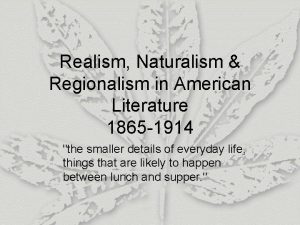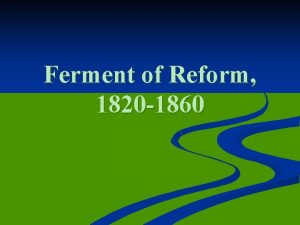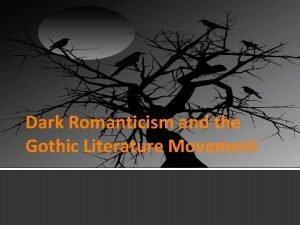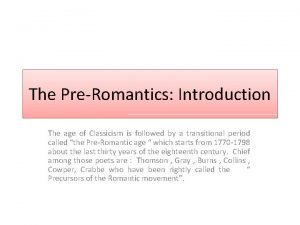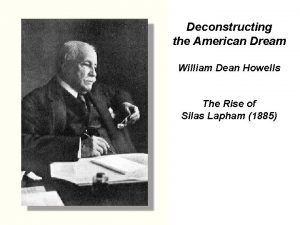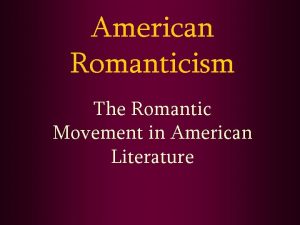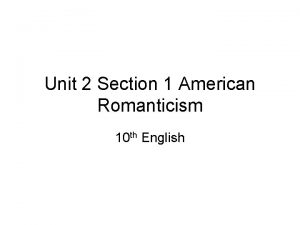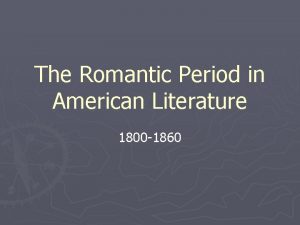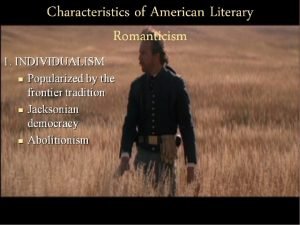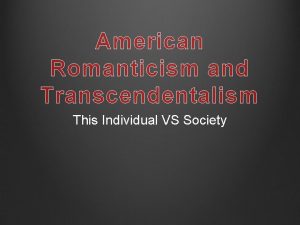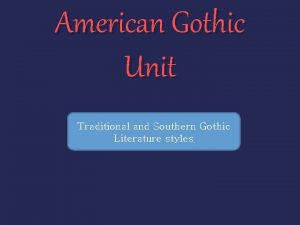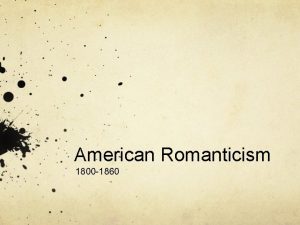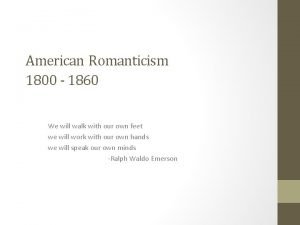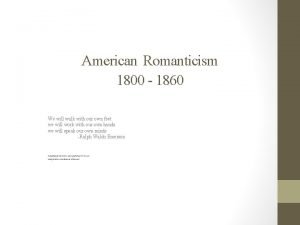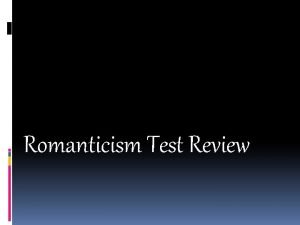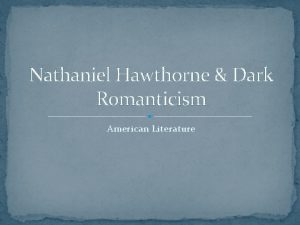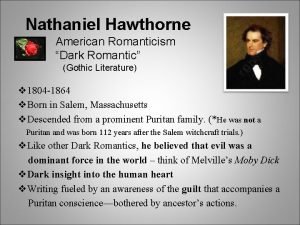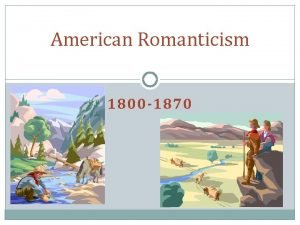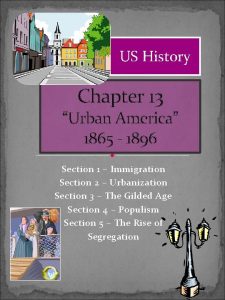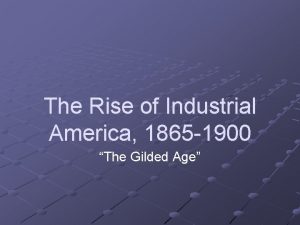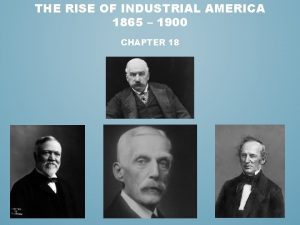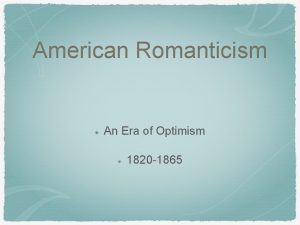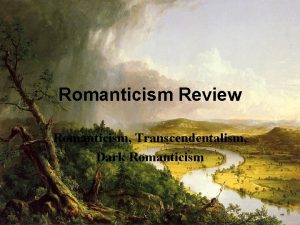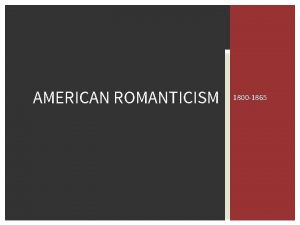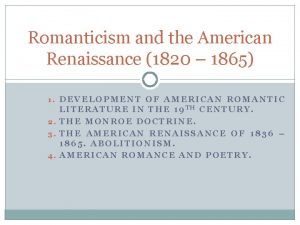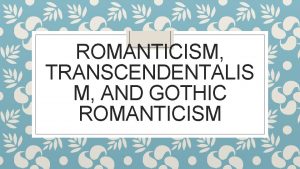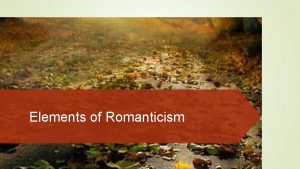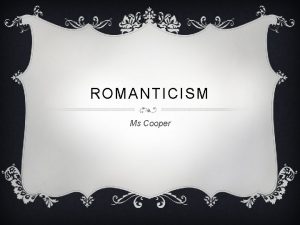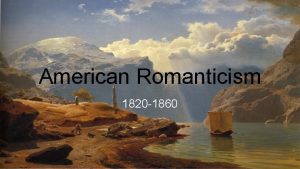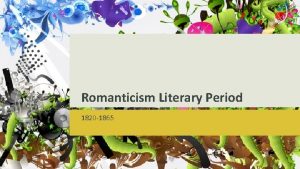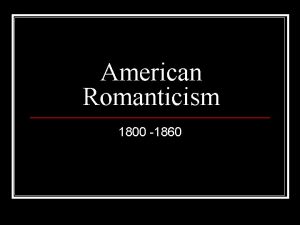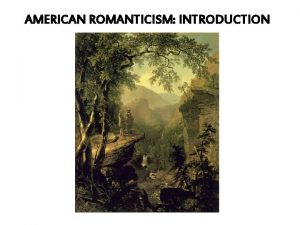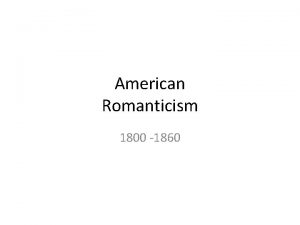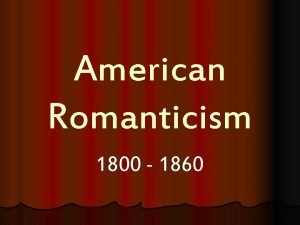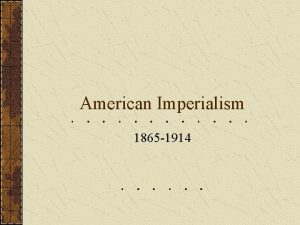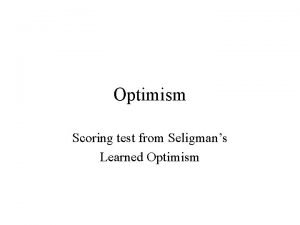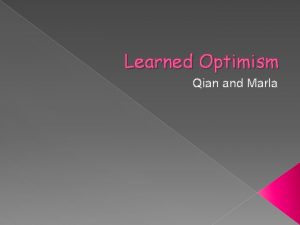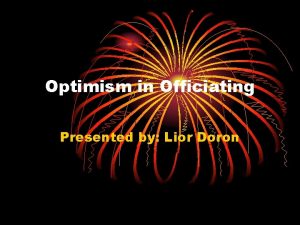American Romanticism 1820 1865 National Optimism n n

























- Slides: 25

American Romanticism 1820 -1865

National Optimism n n n Rapid expansion of US population Agricultural advancement Industrial advancement Frontier Technological advancements

Problems Facing the Nation SECTIONALISM n North vs. South n Economic security/superiority n Slavery expansion n Political leadership

Beginnings of American Literature n Was American lit. to be “strikingly American”? Narrower view n Resulted in hokey work that tried to encompass American in its entirety, praising its past and supposed future greatness n

Or… n Was American writing to be universal and comparable to the great works of Europe? n Broader view that wound up prevailing n Aided by the achievement of Romantic writers

Puritanism ~ 1620 -1700 Purpose for Literature: provide spiritual insight and instruction –Mostly sermons, theological studies, and hymns Puritan Style Simple, Spare, Straightforward.

The Founding Fathers: Neoclassicists 1750 -1800 Emphasized reason, harmony, and restraint Also some embraced Deism

American Romanticism n n n Roots in Europe In the U. S. , it ran from 1820 -1865 Of all the literary and philosophical movements, this one has probably most affected the perception of people’s relationships to others and to God.

n Romance: Less formal version of epic n Noble character on a series of adventures n Pastoral setting n Love interest and the idealization of women

Characteristics of American Literary Romanticism 1. INDIVIDUALISM n Popularized by the frontier tradition n Jacksonian democracy n Abolitionism

Rejection of the Puritan belief in total depravity: § People were naturally benevolent § Mind was a tabula rosa at birth § Corrupted by institutions that sought to dehumanize individuals §People worth highlighting are those closest to Nature Ø “Noble savage”

2. IMAGINATION n Reaction against the earlier age’s emphasis on Reason

3. EMOTION n n n Feeling is now considered superior to rationality or intellect, as the mode of perceiving and experiencing reality Intuition leads one to truth Truth/reality are now highly subjective

4. NATURE n The means of knowing Truth God reveals himself solely through Nature n Nature becomes a moral teacher n n n Eden-like and untouched by Adam’s fall A retreat for men U. S. literature full of lavish descriptions of Nature n U. S. literature different in the sense of wild Nature vs. Europe’s cultivated Nature n

5. DISTANT SETTINGS n n Both in terms of time and place Used to comment on attitudes of the time period

1840 -1855 Part of the American Romantic Movement Believed that: Truth could not be perceived with the five senses Human soul is part of the Oversoul or universal spirit, which it returns to at a person’s death Held nature in as an object of worship

Anti. Transcendentalism Hawthorne and Melville • Evil Abounds • Not Optimistic

GOTHIC ROMANTICISM EDGAR ALLAN POE (1809 -1849) In his short stories and poetry applied universal standards of literary criticism. Developed the American short story; brevity concept.

American Authors

THE KNICKERBOCKERS 1. WASHINGTON IRVING (1783 -1859) Not so much fiction as “sketches” n Distinctly American settings and characters n The History of New York n Narrator: Diedrich Knickerbocker “Rip Van Winkle” and “The Legend of Sleepy Hollow” n n

2. JAMES FENIMORE COOPER (1789 -1851) • First successful American author • Grew up in Cooperstown, NY • Wrote 32 novels, including The Last of the Mohicans and The Leatherstocking Tales

NEW ENGLAND SCHOOL 1. Henry Wadsworth Longfellow 2. Oliver Wendell Holmes 3. John Greenleaf Whittier 4. James Russell Lowell

TRANSCENDENTAL OPTIMISTS RALPH WALDO EMERSON §Famous for poetry, Nature and “Self. Reliance” §Spokesman for transcendentalism who was very optimistic about humans’ benevolent nature §Spent much of his life in Concord, Mass §Lectured and made the rounds as a proponent of transcendentalism

TRANSCENDENTAL OPTIMISTS HENRY DAVID THOREAU Probably best known for Civil Disobedience and Nature Practiced his own preaching Influenced future leaders

n n Walden I went to the woods because I wished to live deliberately, to front only the essential facts of life, and see if I could not learn what it had to teach, and not, when I came to die, discover that I had not lived. I did not wish to live what was not life, living is so dear, nor did I wish to practice resignation, unless it was quite necessary. I wanted to live deep and suck out all the marrow of life, to live so sturdily and Spartan-like as to put to rout all that was not life. . . "
 Regionalism in literature
Regionalism in literature American reform movements between 1820 and 1860
American reform movements between 1820 and 1860 Dark romanticism gothic literature
Dark romanticism gothic literature Pre romantic poetry characteristics
Pre romantic poetry characteristics The romanticism (1795 — 1835) what is romanticism
The romanticism (1795 — 1835) what is romanticism American romanticism characteristics
American romanticism characteristics American gothic romanticism
American gothic romanticism American romanticism authors
American romanticism authors Unit 2 american romanticism
Unit 2 american romanticism American romantic period
American romantic period Individualism romanticism
Individualism romanticism Transcendentalism vs romanticism
Transcendentalism vs romanticism American gothic literature
American gothic literature When was the romantic period in american literature
When was the romantic period in american literature American romanticism 1800 to 1860 worksheet answers
American romanticism 1800 to 1860 worksheet answers Famous american poets
Famous american poets American romanticism 1800 to 1860 worksheet answers
American romanticism 1800 to 1860 worksheet answers Values feeling and intuition over reason
Values feeling and intuition over reason Characteristic of romanticism
Characteristic of romanticism American dark romanticism
American dark romanticism Nathaniel hawthorne romanticism
Nathaniel hawthorne romanticism American romanticism characteristics
American romanticism characteristics Urban america 1865 to 1896
Urban america 1865 to 1896 St helen’s smelting co v tipping (1865)
St helen’s smelting co v tipping (1865) The rise of industrial america 1865-1900
The rise of industrial america 1865-1900 Four features of industrial manufacturing (1865-1900)
Four features of industrial manufacturing (1865-1900)
